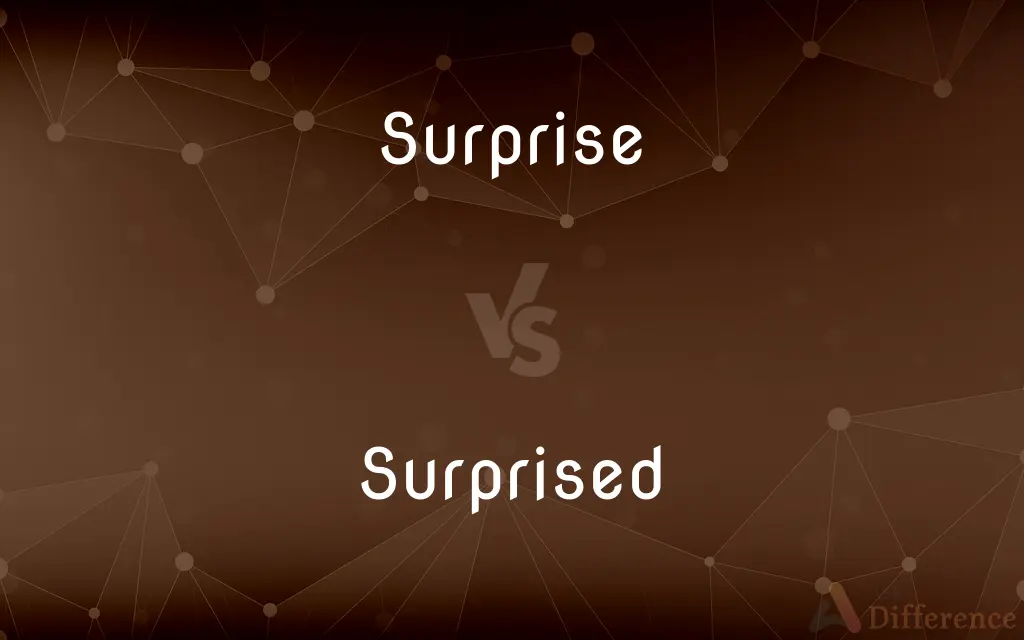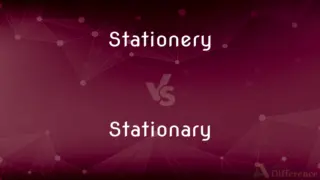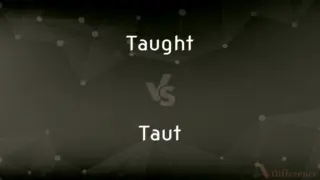Surprise vs. Surprised — What's the Difference?
Edited by Tayyaba Rehman — By Fiza Rafique — Updated on October 30, 2023
Surprise is a noun or verb denoting unexpectedness. Surprised is an adjective describing a feeling of unexpected astonishment.

Difference Between Surprise and Surprised
Table of Contents
ADVERTISEMENT
Key Differences
Surprise, as a noun, refers to an unexpected event or fact. It suggests something unforeseen that can evoke various emotional responses. As a verb, it indicates the action of causing astonishment or unexpectedness.
Surprised is an adjective describing the emotional state of being taken aback or astonished. It implies a reaction to something unforeseen or sudden.
Surprise, in its noun form, often refers to something that is planned yet unexpected for the recipient, such as a surprise party. As a verb, it indicates the act of causing this unexpected event.
The word surprised emphasizes the emotional response or state of an individual who encounters something unexpected. It conveys a sense of astonishment or shock.
Surprise can also carry a neutral or even negative connotation, depending on the context, such as a surprise inspection or a surprise attack.
ADVERTISEMENT
Conversely, surprised usually relates to the emotional impact of the unexpected event, which can range from pleasantly surprised to negatively surprised.
Surprise serves as a versatile word, adaptable as both a noun and a verb, while surprised remains consistent in its role as an adjective.
Comparison Chart
Part of Speech
Noun/Verb
Adjective
Definition
Unexpected event or action
Feeling of astonishment
Usage in a Sentence
"The party was a surprise."
"She was surprised by the party."
Emotional Connotation
Can vary
Mostly refers to the reaction
Examples
Surprise visit, surprise someone
Look surprised, feel surprised
Compare with Definitions
Surprise
To astonish: He planned to surprise her with flowers.
Surprised
Her surprised expression was priceless.
Surprise
The surprise party left everyone speechless.
Surprised
She was surprised at the unexpected gift.
Surprise
His win was a surprise to many.
Surprised
I was surprised to see her there.
Surprise
The snowstorm was a complete surprise.
Surprised
Feeling or showing surprise
There was a surprised silence
Surprise
To cause to feel wonder, astonishment, or amazement, as at something unanticipated
Thinking I was at home, she was surprised to see me in the office. We were surprised that he could recover so quickly.
Surprised
To cause to feel wonder, astonishment, or amazement, as at something unanticipated
Thinking I was at home, she was surprised to see me in the office. We were surprised that he could recover so quickly.
Surprise
To encounter or discover suddenly or unexpectedly; take or catch unawares
She surprised him as he was reading her diary.
Surprised
To encounter or discover suddenly or unexpectedly; take or catch unawares
She surprised him as he was reading her diary.
Surprise
To attack or capture suddenly and without warning
Surprised the sentries in a predawn raid, wounding several.
Surprised
To attack or capture suddenly and without warning
Surprised the sentries in a predawn raid, wounding several.
Surprise
To cause (someone) to do or say something unintended or to be in an unintended condition
"There passed a scene ... that surprised me into courage to come forward" (Fanny Burney).
Surprised
To cause (someone) to do or say something unintended or to be in an unintended condition
"There passed a scene ... that surprised me into courage to come forward" (Fanny Burney).
Surprise
To elicit or detect through surprise
"She occasionally surprised a look on Jemima's face" (Marcia Willett).
Surprised
To elicit or detect through surprise
"She occasionally surprised a look on Jemima's face" (Marcia Willett).
Surprise
The act of surprising or the condition of being surprised
Imagine my surprise on seeing you here.
Surprised
The act of surprising or the condition of being surprised
Imagine my surprise on seeing you here.
Surprise
Something, such as an unexpected encounter, event, or gift, that surprises.
Surprised
Something, such as an unexpected encounter, event, or gift, that surprises.
Surprise
Something unexpected.
It was a surprise to find out I owed twice as much as I thought I did.
Surprised
Caused to feel surprise, amazement or wonder, or showing an emotion due to an unexpected event.
Surprise
The feeling that something unexpected has happened.
Imagine my surprise on learning I owed twice as much as I thought I did.
Surprised
Simple past tense and past participle of surprise
Surprise
(transitive) To cause (someone) to feel unusually alarmed or delighted by something unexpected.
It surprises me that I owe twice as much as I thought I did.
Surprised
Taken unawares or suddenly and feeling wonder or astonishment;
Surprised by her student's ingenuity
Surprised that he remembered my name
A surprised expression
Surprise
(transitive) To do something to (a person) that they are not expecting, as a surprise.
He doesn’t know that I’m in the country – I thought I’d turn up at his house and surprise him.
Surprised
He looked surprised when he heard the news.
Surprise
(intransitive) To undergo or witness something unexpected.
He doesn’t surprise easily.
Surprised
They were surprised by the sudden storm.
Surprise
(intransitive) To cause surprise.
Surprise
(transitive) To attack unexpectedly.
Surprise
(transitive) To take unawares.
Surprise
The act of coming upon, or taking, unawares; the act of seizing unexpectedly; surprisal; as, the fort was taken by surprise.
Surprise
The state of being surprised, or taken unawares, by some act or event which could not reasonably be foreseen; emotion excited by what is sudden and strange; a suddenly excited feeling of wonder or astonishment.
Pure surprise and fearMade me to quit the house.
Surprise
Anything that causes such a state or emotion.
Surprise
A dish covered with a crust of raised paste, but with no other contents.
Surprise
To come or fall suddenly and unexpectedly; to take unawares; to seize or capture by unexpected attack.
Fearfulness hath surprised the hypocrites.
The castle of Macduff I will surprise.
Who can speakThe mingled passions that surprised his heart?
Surprise
To strike with wonder, astonishment, or confusion, by something sudden, unexpected, or remarkable; to confound; as, his conduct surprised me.
I am surprised with an uncouth fear.
Up he starts,Discovered and surprised.
Surprise
To lead (one) to do suddenly and without forethought; to bring (one) into some unexpected state; - with into; as, to be surprised into an indiscretion; to be surprised into generosity.
Surprise
To hold possession of; to hold.
Not with me,That in my hands surprise the sovereignity.
Surprise
The astonishment you feel when something totally unexpected happens to you
Surprise
A sudden unexpected event
Surprise
The act of surprising someone
Surprise
Cause to be surprised;
The news really surprised me
Surprise
Come upon or take unawares;
She surprised the couple
He surprised an interesting scene
Surprise
Attack by storm; attack suddenly
Surprise
The ending of the movie was a huge surprise.
Common Curiosities
Is 'surprise' always positive?
No, it can be neutral or negative depending on context.
Can 'surprised' be used as a noun?
No, it's always an adjective.
Is 'surprise' commonly used in everyday language?
Yes, in various contexts.
Does 'surprise' always involve planning?
No, it can also be spontaneous.
Does 'surprise' have a verb form?
Yes, as in "to surprise someone."
Can 'surprised' describe physical reactions?
Yes, as in a surprised facial expression.
Can 'surprised' describe a long-lasting state?
Typically, it refers to a momentary reaction.
Can 'surprise' be a reaction?
As a noun, it's more of an event; as a verb, it's the action causing the reaction.
Can 'surprised' imply negative emotions?
Yes, one can be surprised in a negative way.
Is 'surprise' used in literature?
Yes, often to describe plot twists.
Does 'surprised' have degrees?
Yes, as in slightly surprised or extremely surprised.
Are there synonyms for 'surprise'?
Yes, like astonishment or shock.
Can 'surprised' refer to pleasant experiences?
Yes, one can be pleasantly surprised.
Is 'surprised' used in formal writing?
Yes, it's appropriate in both formal and informal contexts.
Can 'surprise' be used metaphorically?
Yes, in phrases like "a breath of fresh air was a pleasant surprise."
Share Your Discovery

Previous Comparison
Stationery vs. Stationary
Next Comparison
Taught vs. TautAuthor Spotlight
Written by
Fiza RafiqueFiza Rafique is a skilled content writer at AskDifference.com, where she meticulously refines and enhances written pieces. Drawing from her vast editorial expertise, Fiza ensures clarity, accuracy, and precision in every article. Passionate about language, she continually seeks to elevate the quality of content for readers worldwide.
Edited by
Tayyaba RehmanTayyaba Rehman is a distinguished writer, currently serving as a primary contributor to askdifference.com. As a researcher in semantics and etymology, Tayyaba's passion for the complexity of languages and their distinctions has found a perfect home on the platform. Tayyaba delves into the intricacies of language, distinguishing between commonly confused words and phrases, thereby providing clarity for readers worldwide.














































